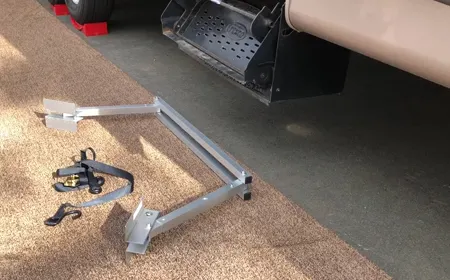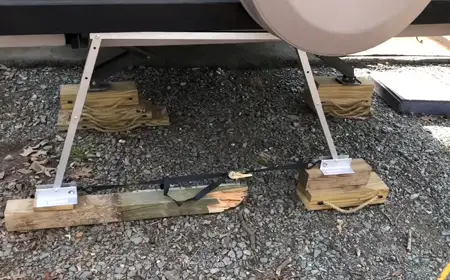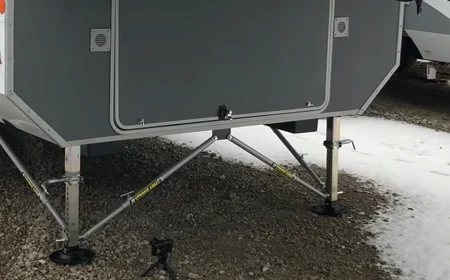RV stabilizers are supposed to make your life easier by keeping your RV steady while you are parked, but sometimes these seem to do the exact opposite making a lot of noise. What could be causing this noise?
We understand how you feel when your RV stabilizer starts making noise. That’s why we created this guide based on your query. We have a better solution for stopping RV stabilizers from making noise. We will explain what could be causing the noise and tips for reducing noise from your RV stabilizers.
Why Does Stabilizer Make Noise : 10 Reasons

If you own an RV, chances are you’ve had to deal with the occasional noise from your stabilizers. Whether it’s a loud bang when they first deploy or a high-pitched squeal as they work to level out your rig, stabilizer noise can be pretty unpleasant.
But what exactly causes this noise, and is there anything you can do about it? Here are 10 possible explanations for why your RV stabilizers might be making noise:
- The most common cause of stabilizer noise is simply because they are made of metal. As the stabilizers deploy, the metal components collide, causing a loud banging noise.
- If your RV is not level when deploying the stabilizers, this can also cause noise. The stabilizers must exert more effort to level out the rig, which can cause them to bang or squeak as they operate.
- Another source of noise from stabilizers is rust formation on the moving parts. Over time, this build-up can restrict movement and cause the stabilizers to work harder, leading to increased noise levels.
- Stabilizer noise can also be caused by incorrect installation. If the brackets or bolts connecting the stabilizers to your RV are loose, this can allow for excessive movement and produce more noise than usual.
- Loose bolts or screws on the outside of the RV can also make it easier for road vibration to travel through the frame and into the interior cabin, amplifying any existing noises from the stabilizers.
- Worn-out or damaged parts may also cause increased noise from stabilizers. Over time, the bushings and bearings supporting the moving parts can wear down, causing increased friction and a louder overall operation.
- Excessive wobble in your RV can also cause the stabilizers to make more noise than usual. This is because they will have to work harder to keep the rig level if it’s constantly shifting around.
- Improperly inflated tires can also lead to increased stabilizer noise. If your tires are underinflated, they will absorb more shock from bumps in the road, causing them to bounce around more and making it harder for the stabilizers to keep things level and silent.
- Hot weather can also contribute to increased stabilizer noise levels. As metal components heat up from exposure to sunlight, they can expand and rub against each other more readily, causing increased friction and more noise.
- Due to age and wear-and-tear on the overall system. No matter how well you maintain your RV, over time, things will loosen up and break down, leading to more rattles, squeaks, and bangs.
So there are possible reasons why your RV’s stabilizers might be making more noise than usual. If you’re concerned about any increases in noise levels, be sure to have your local RV dealer check things out to make sure everything is in good working order. With a little bit of regular maintenance, you should be able to keep those unwanted noises to a minimum.
Working Mechanism of an RV Stabilizer

RV stabilizers are a device that helps to keep your RV level steady and stabilize while you are parked. They all work in basically the same way.
- It works by attaching to the frame of your RV and then extending out to the ground, where it can be adjusted to provide support.
- RV stabilizers have shocks or springs that help to absorb bumps and shocks, providing an additional layer of protection for your RV.
- Most stabilizers have a base you set up under your RV’s tire.
- Use a crank as needed to level the RV.
- Some stabilizers also have jacks that you can use to level the RV side-to-side.
- Once your RV is level, the stabilizer will help keep it from moving around, even in strong winds or uneven ground.
An RV stabilizer is a versatile and essential piece of equipment that can be a great way to prevent damage to your RV and ensure that you always have a comfortable place to sleep.
Types of RV Stabilizer
There are two main types of stabilizers: manual and electric. Manual stabilizers typically consist of a series of jacks that are placed under the RV and lowered to support it. Electric stabilizers use hydraulics to raise and lower the RV.
Both stabilizers are designed to keep the RV level, preventing it from rocking or swaying while parked. Stabilizers are an essential safety feature, as they help to avoid accidents and injuries. They are also a great way to keep your RV in good condition, as they minimize stress on the frame and components.
What Does an RV Stabilizer Do?
An RV stabilizer keeps your recreational vehicle level when you are parked. It accomplishes this by creating a firm connection between your RV and the ground. This connection helps to distribute the weight of your RV more evenly, reducing the likelihood of it rocking or tipping over.
A stabilizer can also reduce noise and vibration, making it more comfortable to camp in your RV. Not all RVs have a built-in stabilizer, but they can easily be added as an aftermarket accessory. If you frequently camp in your RV, a stabilizer is an essential piece of gear to help keep you safe and comfortable.
Why Might You Need an RV Stabilizer?

You must consider investing in an RV stabilizer if you plan extensive travel in your recreational vehicle. An RV stabilizer is still a wise investment, even if you only plan on taking short trips.
It will give you peace of mind knowing that your RV is safe and secure, no matter what the road throws at you. Here are some reasons:
- RV stabilizers are essential to keep your RV level when parked on uneven ground. This is accomplished by distributing the weight of your RV evenly. They prevent the RV from shifting when you move around inside it.
This is especially important on hot days when the ground is soft and uneven. By keeping your RV level, stabilizers help prevent tires from being damaged and make it easier to cook, sleep, and live in your RV.
Most stabilizers feature two or more telescoping legs that can be extended to different lengths. Once the stabilizer legs are in place, you can use the leveling jacks to raise or lower the RV until it is level.
Using stabilizers can significantly reduce the amount of time and effort required to level your RV; and also can help to protect your RV from damage caused by parking on uneven ground.
- RV stabilizers prevent deterioration to your suspension by absorbing shocks and vibrations. They are typically installed at the corners of the RV, and they work by suspending the RV’s weight on a cushion of air or fluid.
Stabilizers help to distribute vehicle weight evenly so that the suspension does not have to work as hard. All of these benefits together can extend your RV’s suspension and save you money in the long run, and also make your ride more comfortable.
- RV stabilizers help to improve gas mileage by reducing drag on the tires. Both wind and road resistance can cause tires to wear down more quickly, decreasing gas mileage. By reducing drag, they help to prolong the life of tires and keep them running at peak efficiency.
Stabilizers help to improve handling by keeping the trailer from swaying back and forth. This not only makes for a smoother ride but also helps to preserve tires. As a result, RV stabilizers can play a significant role in improving both gas mileage and tire life.
- RV stabilizers are designed to help increase stability in high winds. They work by creating a low center of gravity and reducing the windage of the RV. They help to reduce movement and shaking when the RV is in motion.
The stabilizers can be adjusted to different positions depending on the level of wind protection desired. The higher the stabilizer, the more stable the RV will be.
They help distribute the RV’s weight evenly and work by attaching it to the ground, preventing it from being blown over by strong gusts of wind. By using RV stabilizers, you can help to ensure that your RV remains stable in high winds.
- When driving an RV down the road, keeping the vehicle steady is essential. Besides smoothing out the ride, this will also reduce wear on your brakes. RV stabilizers help by keeping your RV level and reducing swaying.
They work by absorbing the shocks from bumps in the road and transferring them to the ground. This helps to distribute the force evenly, keeping your RV from bouncing around. Stabilizers help keep your tires in contact with the ground, reducing wear and tear on your tires and brakes.
Stabilizers help extend your RVs brake life and improve travel safety by keeping your vehicle level and preventing it from rocking back and forth.
Relevant Article To Read: Stabilizers on Fifth Wheels: How Do You Install Them?
On a Final Note
Considering all these, the time has come to wrap this up. RV stabilizers make noise because they are doing their job of distributing the weight of the RV. They also help prevent flat tires, reduce wear and tear on the suspension, and keep the RV level in high winds.
All these factors contribute to why RV stabilizers make noise. Ultimately, it is up to the driver to determine whether the noise is worth it. Some people may be curious about why does stabilizer make noise, while others may appreciate the peace of mind of knowing their RV is stable and level. Only you can decide what is best for you and your RV.
Leave a Reply